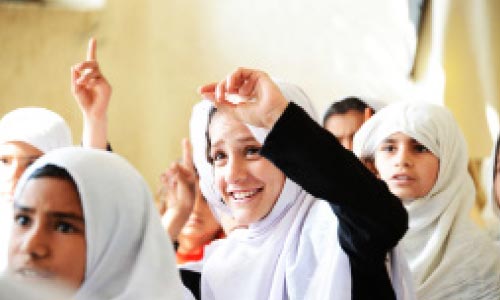MAZAR-I-SHARIF - The provincial Women’s Affairs Department says it considers restrictions on girls to get education a worst form of violence against women.
Meanwhile, the Education Department assures measures have been undertaken to resolve problems girls face in obtaining education.
Forty percent of the totally enrolled students in Balkh are girls but many girls in districts are out of school, a huge issue which remains unresolved.
Arefa Safar, Women’s Affairs director, said preventing girls from getting education and forcing them to quit schools in the middle was main reason behind violence against the gender.
She said girls were only allowed to attend school up to class sixth in districts and then stopped from going to school.
“Access to school is easy in Balkh, but the main problem is with families. Most of our families encourage their boys to study up to doctorate and master’s level but they stop girls from going to a nearby school,” she said.
Safar asked religious scholars, tribal elders and families to play their role in finding solution to the problem.
Nadia, a girl, said she stopped going to school after passing the 7th class due to strong criticism of her family.
She said her brothers, and uncles forced her to stop going to school after passing the 7th class.
“I tried to convince my family to allow me to school, but they said it was a wrong practice, people would say a virgin girl is going to school and would say many other insulting things,” she said.
Nadia said she was finally succeeded to get permission to continue her education and now she was a university student after successfully completing her high school.
Haji Akhtar Mohammad, a tribal elder in Chamtal district, said due to lack of female teachers, families did not want to send their girls to school.
He said families allowed their girls to joint attend classes with boys until class fifth but not after that.
“Compared to the past, people’s mind set has changed and now most families want their children to go to school.”
A provincial council member of Balkh, Tahira Haqjo, said that security problems, lack of female teachers and illiteracy were reasons people did not let their girls go to schools in districts.
She said girls who could not attend school faced many problems when they grew up. She criticized the Ministry of Women’s Affairs and women activists for not discharging their responsibilities towards the problem.
“We see programs about women rights in the city hotels every day, but there are no much problems in cities, the attention should be paid to districts,” Haqjo said.
She added public awareness programs about women should be held in districts of the province instead of cities.
Haqjo asked the Ministry of Hajj and Religious Affairs to encourage people through mosques and imams to send their children including girls to school.
“Women who are educated are much happier in their lives than those who are uneducated”, she said.
Balkh education director Aliullah Amiri acknowledged girls in districts of the province rarely completed their education.
He said his department had taken steps for identifying real obstacles to girls’ education and finding solutions to them.
He said teams had been sent to districts to find how many girls were outv of school and why.
“Some families do not allow even their minor girls to get education”, he added.
Besides negative traditions, lack of female teachers in schools is another reason that girls leave their education, Amiri said.
He said efforts were on to increase the number of female teachers and encourage girls to attend schools. He added that the lack of a safe educational environment in some districts also caused some families not to allow their girls to go to schools.
“Most of our schools in districts do not have surrounding walls, it is a serious problem, but the education department is working for solving this issue,” he added.
Amiri said families would be encouraged to let their girls attend schools through parents’ councils of students.
An Islamic scholar, Mualvi Ziauddin Hanafi said that education was mandatory for both men and women in Islam.
He said it was responsibility of the government to provide a safe educational environment and pay attention to girls’ education. (Pajhwok)
Home » Afghanistan » Many Girls in Balkh Districts Forced to Quit School Early
Many Girls in Balkh Districts Forced to Quit School Early

